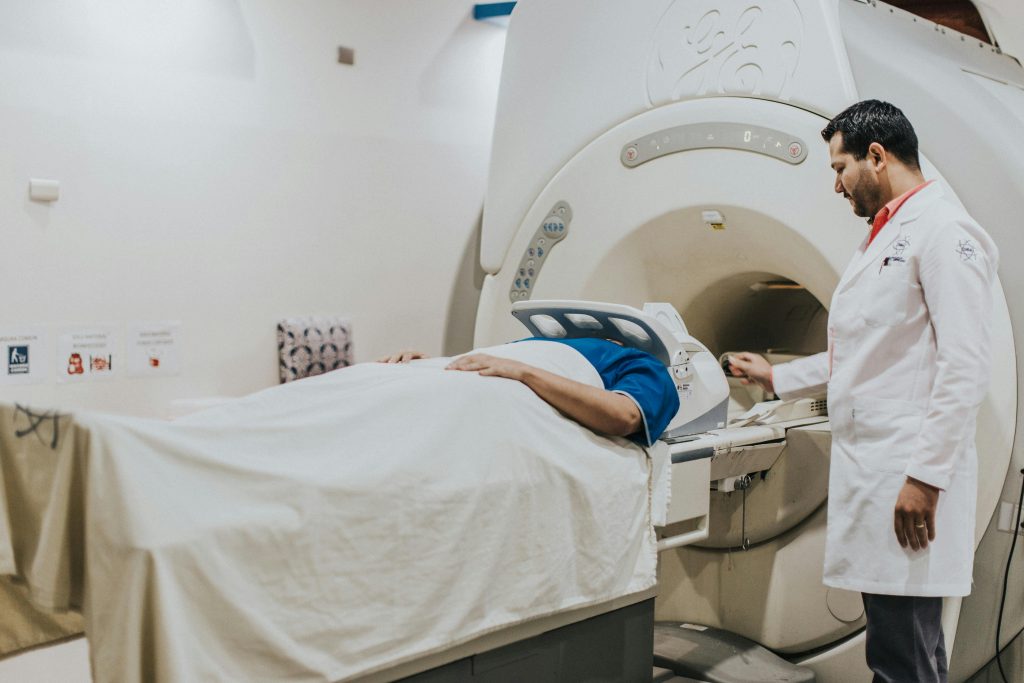Chapter 2: The Organization of Hospitals
Outpatient Hospital Departments
Hospitals often have a variety of specialized outpatient clinics which complement the type of inpatient services they offer. Patients who do not need to spend a night in a hospital are considered outpatients; their hospital stay is less than 24 hours. For example, if a hospital is designated as the cardiology centre for the region, it will likely have a variety of outpatient cardiac clinics, as well as inpatient cardiac units such as CCU, cardiology, or CVICU. In addition, most general hospitals will offer a variety of routine diagnostic and therapeutic services that serve the needs of both outpatients and inpatients, such as laboratory or diagnostic imaging services.
Similar to inpatient units, outpatient departments typically require clerical support. Given their outpatient nature, these departments are typically staffed during the day from Mondays to Fridays. However, some diagnostic services which provide 24/7 support for inpatient units and the emergency department may have expanded clerical coverage.
Below is a list of some outpatient departments commonly found in mid-size hospitals. Larger hospitals, or hospitals providing specialized services, will have many more focused outpatient clinics and services that are noted here.
Outpatient Hospital Departments/Clinics
Airway Clinic/Pulmonary Function Lab: Provides respiratory education, rehabilitation, and diagnostic testing such as pulmonary function tests (St. Mary’s General Hospital, 2024a).
Cardiac Rehab: Provides exercise programs, education and counselling regarding healthy lifestyles for patients with a cardiovascular condition (St. Mary’s General Hospital, 2024b).
Cardiac Catheterization/Cath Lab: Performs cardiac catheterization procedures to diagnose or treat heart conditions, including coronary artery disease, arrhythmias, heart failure, or valve disease.
Cardiac Testing: Provides a variety of cardiac outpatient testing such as echocardiograms, ECGs, Holter monitors, and stress tests.
Colposcopy Clinic: Provides diagnosis and treatment for women who have an abnormal pap test, precancerous disorders or vulva, cervix and vagina, or genital warts (University Health Network, 2024a).
Cystoscopy Clinic: Performs diagnostic procedures to evaluate the lower urinary tract, including the bladder and, in men, the prostate, to identify tumours, stones or other abnormalities (University Health Network, 2024b).
Diabetic Clinics: Provides patient teaching from both RNs and dietitians about managing type 1, type 2, gestational, and pre-diabetes.
Diagnostic/Medical Imaging: Provides a wide range of imaging services such as x-rays, ultrasound, CT, and MRI imaging to diagnose and monitor medical conditions.

Dialysis Unit: Provides outpatient blood filtration procedures for patients with kidney failure. Often the same patients come in weekly or a few times a week for dialysis (Sturdy & Erikson, 2022).
Endoscopy Unit: Provides a wide range of clinical investigations and procedures to patients with bowel, stomach, liver, pancreas, and lung-related disorders, such as colonoscopy or bronchoscopy (Hamilton Health Sciences, 2023).
Fracture Clinic: Provides casting, splinting, some dressing changes and removal of sutures, injections, and aspirations for patients with bone, joint, and soft tissue injuries (Grand River Hospital, 2024).
Geriatric Medicine Clinic: Provides comprehensive assessment and community support referrals for patients who have complex conditions associated with aging, including memory loss, mobility problems and falls (University Health Network, 2024c).
Infusion Clinic: Provides outpatient intravenous therapy for patients requiring IV medications such as biologics, antibiotics, or blood products.
Laboratory Services: Provides a wide range of tests on specimens, including blood, body fluids, and tissues, to diagnose, monitor and treat disease. Laboratory services in larger hospitals are typically divided into several departments, including biochemistry, hematology, microbiology, blood bank, pathology, and immunology.
Mammography Unit: Provides services to examine and diagnose breast tissue health and screen high-risk and average-risk individuals for breast cancer.
Newborn Clinic/Bilirubin Clinic: Provides infant assessment, bilirubin level monitoring, and breastfeeding assistance for the immediate post-delivery period (North York General, 2024).
Nuclear Medicine: Provides a range of scans using special radioisotopes for diagnosis and treatment of disease (St. Mary’s General Hospital, 2024c).
Physiotherapy Clinic: Provides physical rehabilitation to help patients regain, maintain and improve their physical function after surgery or injury, or to help manage chronic conditions.
Rheumatology Clinic: Provides treatments to reduce pain, disability, and joint damage to patients with diseases such as arthritis, gout, scleroderma, and lupus (St. Joseph’s Health Care London, 2023).
Special Testing: Provides a variety of neurology tests such as EMGs and EEGs.
References
Grand River Hospital. (2024). Fracture clinic.
Hamilton Health Sciences. (2023). Endoscopy procedures and & GI investigations.
North York General. (2024). Newborn follow-up clinic.
St. Joseph’s Health Care London. (2023). Rheumatology centre.
St. Mary’s General Hospital. (2024a). Airways clinic: Outpatient respiratory care.
St. Mary’s General Hospital. (2024b). Cardiac rehabilitation.
St. Mary’s General Hospital. (2024c). Nuclear Medicine.
Sturdy, L. & Erikson, S. (2022). The Language of Medical Terminology. NorQuest College, Open Education Alberta.
University Health Network. (2024a, January 23). Colposcopy clinic.
University Health Network. (2024b). Cystoscopy clinic.
University Health Network. (2024c). Geriatric Medicine Clinic.
Attributions
“Man During Magnetic Resonance Imaging” by Charlss GonzHu; used under the Pexels license.

